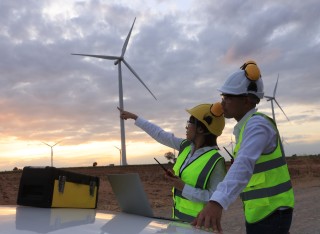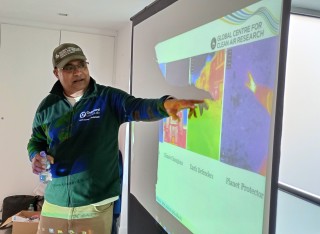
Dr Valentine Seymour
About
Dr Valentine Seymour has over 10 years’ experience undertaking deliberative, systems thinking and policy evaluation, natural capital assessments, ecological citizen science and environmental social science research. Valentine has a PhD in Civil, Environmental and Geomatic Engineering from UCL, and is a Lecturer at the University of Surrey. She has trained and has developed the use of deliberative methods for environmental impact and policy evaluation, product evaluation and design across various projects. These have included the NHS’s National Clinical Audit System, Defra’s 25 Year Environment Plan and most recently the current project evaluating the previous Heat Health and Cold Weather Alerting System for Public Health England.
Sustainable development goals
My research interests are related to the following:

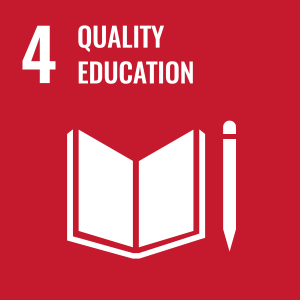

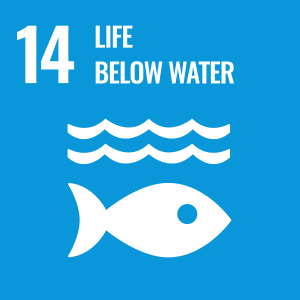
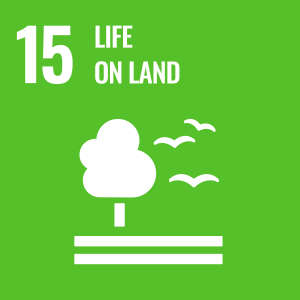

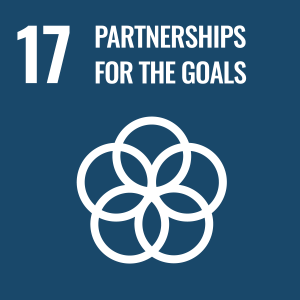
Publications
In recent years, there has been a significant shift from threshold-based to impact-based weather alerting systems. This paper evaluates the impact of this transition within the Weather-Health Alerting (WHA) system in England, which is used to notify the health and social care sector about adverse weather events. The evaluation was conducted after the system's first year of operation to assess its effectiveness in supporting emergency planners and frontline health and social care staff. Findings show that the shift to an impact-based system has been broadly successful. Stakeholders reported that the most valuable component of the new system is the information provided on expected impacts, which has improved the relevance and utility of the alerts. However, the evaluation also identified several minor concerns, particularly around the clarity of distinctions between alert levels and the volume of information included in alerts. These issues may warrant further refinement in future iterations of the system. Overall, this paper situates the findings within the wider context of climate adaptation and public health resilience, highlighting the essential role of clear, actionable alerting systems in mitigating the health impacts of extreme weather.
Social sciences are vitally important to understand and address processes and issues in society, including environmental issues. The potential value and contribution of social science for research and policy and practice has been discussed since the 1960s (Caswill & Lyall, 2013), and a substantial number of outputs on the topic have been produced. This annotated bibliography provides signposting to key publications. It contains examples of work written from academic and non-academic perspectives. The annotated bibliography can be used as a tool to champion greater use of social sciences in inter- and transdisciplinary research, to justify funding or non-financial support for social science, or to help create an evidence base for the use of social science in policy and practice. It forms part of a suite of documents and tools aimed at championing the importance and uniqueness of Environmental Social Science (ESS) and promoting its use and impact. These include a definition and dimensions document (Gatersleben, Warren, Marselle, et al., 2024), information on toolkits that support ESS knowledge exchange (Contreras et al., 2024), and an overview of useful case studies (Warren & Gatersleben, 2024). Where most of these documents focus specifically on the role of social science in understanding and tacking environmental issues and people-environment interactions, this annotated bibliography also includes key publications that discuss the value and impact of social science in understanding and tackling social issues more broadly.
Despite growing interest, public uptake of 'smart home technologies' in the UK remains low. Barriers for accepting and opting to use smart home technologies have been linked to various socio-technical issues, including data governance. Understanding barriers for accepting to use smart home technologies is therefore important for improving their future design. Equally, enabling the public to help shape design features of these technologies from evidence-informed and deliberative approaches is also important. However, this remains an understudied area. This article reports a UK study exploring public opinion towards smart home technologies, using a Citizens' Jury method. Findings indicate that whilst participants identified the benefits of smart home technologies, participants' data sharing intentions and practices are contingent upon the condition of trust in technology developers. Study outcomes could support practitioners and policymakers in making informed, citizen-led decisions about how to adapt existing data governance frameworks pertaining to smart home technologies.
Why we need Environmental Social SciencesEnvironmental issues are ultimately social issues. They are caused by, understood by, and must be solved by, people as individuals, groups, communities, political and institutional systems.Securing the future of our planet and the wellbeing of humankind requires an in-depth understanding of the interdependent relationships between people and their social and natural environment. It requires knowledge and expertise of all environmental social sciences.Who is this document for?This document is for anyone with an interest in understanding and tackling people-environment relationships and environmental problems. This includes those working as, or with, environmental social scientists in academia, policy and practice, as well as scientists, knowledge brokers and policy makers and practitioners wishing to explicitly consider people-environment relationships in their work. This may include questions around climate change, net zero emissions, nature-climate relations, biodiversity, use of natural resources, consumer choices, as well as people’s relationships with their natural environment and non-human nature.Why this document is neededEnvironmental problems are deeply rooted in social structures and tackling these problems requires significant social transformation for which environmental social science (ESS) knowledge and expertise is essential. However, the potential value and role of environmental social sciences in research and policy and practice is not always clearly valued or understood. Overlooking the vital role of people and ESS insights contributes to inadequate environmental policy.Social sciences can sometimes be dismissed as common sense and is too often carried out by those without proper training and social science expertise is often under resourced. There is frequently a narrow understanding of the range of insights, tools and techniques that different environmental social sciences can offer.Knowledge of and requests for environmental social sciences (for instance by other researchers or decision makers) is often limited to research that studies how end users (consumers) respond to new technologies or environmental policies after the problems have been framed and the solutions have been designed. Knowledge of ESS research is often based on outdated ways of thinking, for example the knowledge-deficit model, which assumes that people lack the knowledge to “do the right thing”. There is also less emphasis on more inclusive methods that bring different groups into framing the problem. However, there is a huge variety of different types of environmental social sciences. Social science has played an important and significant role in research impact. Researchers have a vast array of methods and knowledge at their disposal that is critical to help understand and improve people-environment interactions and successful delivery of policy and practice. Environmental problems require insight and knowledge from a range of different disciplines, including social sciences. This document provides a synopsis of what environmental social science is, what it does and what it can offer to environmental research, policy and practice.
The Environmental Social Science kNowledge Exchange Map of Opportunities (ESS NEMO) is a package of systems maps and associated documentation that show the groups, organisations and individual actors that environmental social scientists could engage with in knowledge creation and/or exchange in the UK. ESS NEMO is a tool that, among other rationales, aims to promote greater collaboration and trust between environmental social scientists, and with other groups that may not traditionally be included in ESS activities. Environmental Social Science (ESS) is defined as the systematic study of people and their social and their non-human physical environment (their habitat) (Gatersleben et al., forthcoming). The information presented in ESS NEMO reflects the situation as of 10th July 2024. It is acknowledged that the landscape is dynamic, and changes frequently over time.
Advancing Capacity for Climate and Environment Social Science (ACCESS) is an Economic and Social Research Council (ESRC) funded project, which aims to champion and coordinate social science research, to build capacity and promote and enhance the value of environmental social science in research and practice to address key environmental challenges. ACCESS’s first step is to learn from the past experiences of social scientists in climate and environment training, research, policy and practice through various research activities. This report summarises the key findings of one of these activities: exploratory interviews with participants from academic, governmental and non-governmental sectors to explore the impact of UK-based Environmental Social Science (ESS) into policy and practice. Specifically, this report focuses on participants’ experiences of the factors hindering or enhancing the integration of ESS into policy and practice. The aim of this research is to provide evidence to promote greater inclusion of ESS into policy and practice by outlining the key factors influencing its impact. To achieve these wider project aims, findings presented here will be combined with evidence emerging from other activities conducted within the ACCESS project to inform a broader set of recommendations to enhance the inclusion of ESS into research, training and policy and practice. This is with the wider ACCESS goal of supporting and building capacity for ESS in the UK. Findings presented in this report, and subsequent reports of this nature, can be applicable for those working in academia, the government agencies (intermediates), non-governmental organisations, and the policy makers wanting to understand current and future ways in which UK-based ESS can be integrated into research, training, and policy and practice. It is important to note that perceptions of enhancing and hindering factors were collected through the interviews; assessing the extent of their reality in practice would require other observatory methods that were not undertaken in this study (see Newman, 2023).
This annotated bibliography acts as a sister document to the literature review on working with other disciplines and stakeholders (Warren et al., 2024), providing detail on key reports, articles, books and book chapters cited in the larger central report on the benefits, drawbacks, barriers and drivers of working with other disciplines and stakeholders, accessible here: https://accessnetwork.uk/wpcontent/uploads/2024/05/Benefits-drawbacks-barriers-and-drivers-of-working-with-other-disciplinesand-stakeholders-ACCESS-literature-review.pdf. In line with our goals of mapping, assessing and learning from past and present evidence to support Environmental Social Science (ESS) in research and policy & practice, this annotated bibliography provides key sources for evidence on factors influencing working with other disciplines and stakeholders. For each source, a brief overview of the contents, arguments, and findings from each evidence source are outlined. Sources are listed in alphabetical order. This annotated bibliography is particularly targeted at non-academic social scientists and researchers, aiming to provide this group with a more accessible form of digesting information on working with other disciplines and stakeholders. In addition, this annotated bibliography aims to signpost to particularly influential, interesting or informative resources for future ESS initiatives aspiring to include a range of different disciplinary perspectives or stakeholders.
Extreme weather alerting systems are one of the central tools utilised in adapting to changing weather patterns resulting from climate change. This paper evaluates the effectiveness of the current alerting systems for hot and cold weather used in England to notify the health and social care sector of upcoming extreme weather events. We consider the views of stakeholders on the current system and explore their perspectives on the proposal to move towards an impact-based system. The paper concludes that while the current system is an effective tool, stakeholders feel they need to draw on additional material to assist with the development of an appropriate response. We also highlight that many stakeholders are concerned about the potential for creating alert fatigue due to a lack of clarity of the geographical area impact of some of the alerts. Consequently, there was a high level of support from stakeholders for the move towards an impact-focused system.
The fast-growing sensing technology means there is an extensive range of low-cost indoor air quality (IAQ) devices or sensor modules readily available on the commercial market. However, less attention has been paid to exploring people’s perceptions and responses to indoor air pollution. Such knowledge is deemed important for improving the design of future IAQ sensors, enhancing public awareness and providing guidance on ways to improve indoor environmental conditions. This study aimed to explore people’s perceptions and responses to IAQ under different quasi-experimental environmental conditions and levels of information. The study is reported from the perspective of 16 staff and students at a UK university, held within a prototype smart and modular home built on campus. It compares questionnaire survey responses and focus group interview discussions with actual IAQ concentrations and other influential indoor parameters (indoor air temperature and relative humidity). Study outcomes revealed the importance of understanding contextual factors when developing feedback and communication strategies to best improve people’s awareness, acceptance, and behavioural responses to IAQ. Findings highlight the usefulness of focus group discussions in the design of future IAQ sensors.
This article aims to explore the use of the user-centered design (UCD) method, mental model approach, of those who engage in environmental volunteering to work toward the development of a health-related impact measurement tool. It reports a case study which explores the use of one UCD method, a mental model approach. This is an understudied area of research that would be considerably valuable for practitioners in the voluntary sector who wish to create their own health-related impact measurement tool. Focus group interviews are used to explore how volunteers perceive the term health, their conceptual understandings, terminology used, and the attributes to measure it. This study is reported from the perspective of U.K. environmental charity, The Conservation Volunteers (TCV). Findings from this article can be used by other voluntary organizations and charities to help shape their own health-related impact measurement tool and the ways in which these tools can be tailored to suit their individual needs.
The need for the world to follow a more carbon-neutral path is clear, with growing evidence highlighting the existential threat posed by unregulated GHG emissions. Responsibility for achieving this does not only lie with policy makers but is shared with all stakeholders including governments, private sectors, charities and civil society as a whole. Several methodological approaches have been developed to set emission reduction targets, including the Science-Based Targets Initiative (SBTi). However, it is yet to be widely adopted, and as thought leaders in the field, universities must take a lead in its interpretation and application. This study is reported from the perspective of a UK university, which is adopting climate change considerations to facilitate achieving Czero by 2030 and will act as an exemplar case. We calculate baseline emissions, science-based reduction targets for different carbon emission reduction methods and options in terms of financing emission reduction pathways at present and in the future. The study outcomes show that incorporating a SBTi methodology can serve as insight into other medium-sized organisations and universities wishing to develop a net-zero pathway. These results have been summarised into a series of recommendations.
While there is growing interest in the design and deployment of smart and modular homes in the UK, there remain questions about the public’s readiness and willingness to live in them. Understanding what conditions prospective residents might place upon the decisions to live in such homes stands to improve their design, helping them to meet with the expectations, and requirements of their residents. Through direct interaction with a prototype of a smart and modular home within a university context, the current study investigated how people negotiate the prospect of smart and modular living, and the conditions they would place on doing so. The study explores the short observational experiences of 20 staff and students within a UK university context, using think aloud interviews. Findings indicate that whilst participants were able to identify the benefits of smart and modular homes, there were nuanced responses when they negotiated the challenges of living. Further, a framework of considerations and recommendations are presented which could support practitioners and policy makers in making more informed, citizen-led decisions on ways to adapt and improve these home solutions.
There are several frameworks which have been developed to describe the Natural Capital assessment approach. However, some of these frameworks are not fully operational in practice, and there is no unified methodology. Furthermore, calls have been made to increase the public's awareness and understanding of Natural Capital issues. To address some of these limitations it has been suggested to incorporate citizen science methods, an approach which has been increasingly growing in the Natural Capital field. The purpose of this article is to present a framework within the context of UK environmental policy as a case study. It illustrates the practicalities and the potential of using citizen science and other forms of public engagement approaches within a pre-existing Natural Capital accounting framework. This article first reviews current UK Natural Capital assessment approaches, as well as the potential for including citizen science and public engagement approaches. Combining these approaches, the inclusion of citizen science within the Natural Capital assessment framework is explored through the development of a conceptual model. We argue that the inclusion of a citizen science approach, and other forms of public engagement within the Natural Capital assessment can support in gathering a multidimensional perspective on comprehensive Natural Capital assets, and ecosystem service benefits. Knowledge generated could then be implemented to support holistic decision-making for nature-based solutions.
Engaging in environmental community-based practices such as environmental volunteering has been shown to offer a range of benefits, including social connectivity. There has been a growth in studies exploring the potential impact of people engaging in environmental community-based practices has on the resilience of social-ecological systems. However, these studies have not fully explored those characteristics environmental volunteering groups undertake which can help to promote and support the resilience of social-ecological systems. This study provides further understanding about social-ecological resilience and examines how environmental volunteering has the potential to promote and strengthen the resilience of social-ecological systems. This is explored through the lens of four characteristics regarded as key attributes fostering resilience in social-ecological systems using focus group interviews: activity, self-organisation, connections and skills and knowledge. The study is reported from the perspective of 13 local community groups in Greater London (UK) who engaged in environmental volunteering as a case study. Findings show there to be variability in these characteristics explored amongst local community groups, providing further contextual insight into how these local community groups operate. By exploring these characteristics, groups were able to understand how they operate, knowledge which can then be used to enhance their future activities to help strengthen the resilience of social-ecological systems.
User-Centred Design (UCD) researchers have been investigating smart homes for 20 years and have highlighted the approaches’ effectiveness in identifying the requirements of users. Despite the growing interest in smart homes, research has shown that its adoption remains low. This owes to the tendency for research to often use a technological-centred approach to improve a pre-existing product or tailor it to target users. Visions of smart homes may therefore not have been fully based on a clear understanding of users’ needs and sociotechnical issues of concern. Enabling the public to have a role in shaping the future of smart home technologies and related sociotechnical issues of concern in the early stages of the UCD process have been widely recommended. Specifically, there have been calls to engage the public in sharing responsibility for developing data privacy agreements, data governance frameworks, and effectively domesticating technologies into life and ‘home’ systems. This paper introduces the citizens’ jury method to enable the public to have a role in shaping the future of smart homes and related sociotechnical issues. This is an understudied area of research that would be considerably valuable for practitioners in the usability and smart technology sectors. Findings from this paper are based on a cross-section of UK citizens’, exploring their opinions on sociotechnical issues of data security, accessibility to and control over use of devices and technological appliances associated with smart homes. A set of recommendation are developed to provide guidance and suggested actions on approaching these issues in the future.
